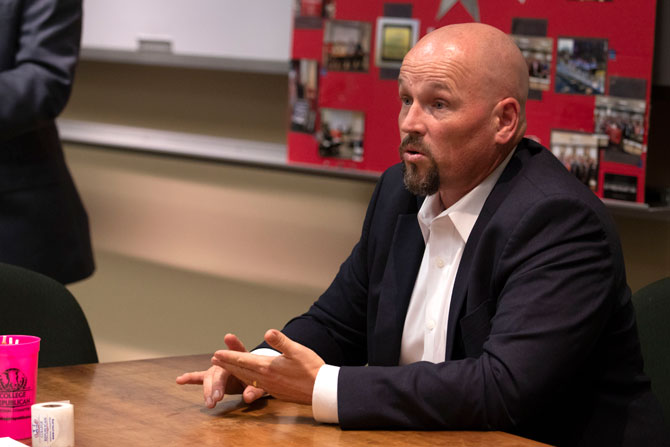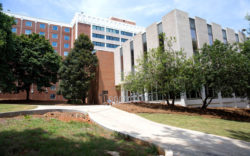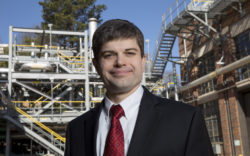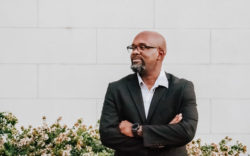For the second year in a row, Republican Marcus Wiedower and incumbent Democrat Jonathan Wallace will face off at the polls to win state House of Representatives District 119 seat.
Last year, Wallace won the district with nearly 57 percent of the vote, defeating Wiedower and two other Republicans. Though Wallace won in a landslide in last year’s special election, Wiedower said he remains confident going into November. “We wouldn’t be in this race if we weren’t optimistic,” he said.
The main issues Wiedower is focusing on going into the election are improving local schools, controlling local transportation projects and not increasing taxes.
Issues Wallace hopes to tackle include lowering health-care costs, providing more funding for schools, pushing cybersecurity and digital privacy and investing in infrastructure that is permissible for future forms of transportation.
Overall, Wallace said health-care costs have been the No. 1 concern among constituents. “When we talk about health-care costs, what we’re really talking about is people’s freedom,” Wallace said. “You want to be able to follow your heart or where your passion leads you to do the best work in this world. You may not be able to do that because you’re forced to work a job that has health care that is necessary for your family.”
Wallace told Flagpole he hopes to close the health-care gap by expanding Medicaid. He added that health care is a growing concern in Georgia, since seven hospitals have closed in the last five years.
Education is at the forefront of both candidates’ campaigns. Wallace said he wants to revisit the formula used to fund schools, which has not been revised since 1985. Meanwhile, Wiedower’s campaign is pushing for improvements to and funding for local schools and ensuring the University of Georgia remains “the economic driver of the community.”
As for transportation, Wiedower wants more local control over transportation projects to ensure that local tax dollars are used within the community.
Wallace’s focus on transportation is lowering automobile insurance and investing in cost-efficient infrastructure that will allow for autonomous fleets. He added that for infrastructure, we must think 20–30 years in advance, since these changes take a long time to implement, citing Georgia Highway 316.
Since Wallace’s expertise is in technology, he said he will continue to push for digital privacy and security. “I think people don’t realize how much information we share with one another, with companies and corporations about our personal lives, and how much power is contained within that information,” he said. “Sharing that information without being cognizant of it will ultimately limit our freedom.”
Another key issue of Wallace’s campaign is to protect the state’s elections by switching to a paper ballot immediately. Georgia’s voting machines are outdated, he says, running on Windows 2000 software.
Wallace is also campaigning on ending gerrymandering by pushing for an independent redistricting commission and allowing Georgians to pre-register to vote when they turn 16.
For Wiedower, a key issue is fostering local, small businesses. “I have owned a business for almost 20 years, and I know firsthand about the taxes and regulations,” Wiedower said. He mentioned that last year Oconee County increased the price of building permits overnight to a range of $4,000–$5,000.
But the hot topic for a majority of conservative candidates during the midterm election has been immigration reform. At a College Republicans meeting on Aug. 29, Wiedower rebuked Wallace and Rep. Deborah Gonzalez (D-Athens) for criticizing Clarke County Sheriff Ira Edwards’ policy of holding undocumented jail inmates for Immigration and Customs Enforcement to deport—a policy Edwards later reversed.
“What you’re not going to see me do is speak out against our sheriff,” Wiedower said. “It’s a growing concern on a daily basis. You can see in the atmosphere that tends to develop around a sanctuary city that it’s not just about criminal illegals… it’s an atmosphere of how we enforce the law. We are a nation of laws.”
In response, Wallace said immigration is not a concern for him nor constituents he has spoken to while canvassing. Campaigning on immigration reform is “appealing to the politics of fear,” he said.
“We’re restricting local freedoms and [forcing] local folks to cooperate with the federal government. From a pragmatic perspective, that does not make financial sense. The federal government has their job, and I expect them to do that. I expect them to provide national defense. When we are talking about national defense, that’s not the problem in this specific case. This is forcing our local governments, restricting their choice and forcing them to do things that don’t make sense for them,” Wallace said.
Four local children lost their father when he was deported over a traffic violation, Wallace said. “That [is the] impact we have to be conscious of when we talk about these policies and cite concerns.”
Like what you just read? Support Flagpole by making a donation today. Every dollar you give helps fund our ongoing mission to provide Athens with quality, independent journalism.











